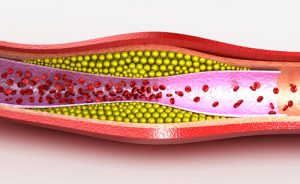Talk About Cholesterol
With all this talk about cholesterol, one would think we would know what we are talking about. But if you stop the average person on the street and ask: “What is cholesterol?” … most people would fumble over their definition like a first time dancer attempting to do the tango. It may surprise you to know that cholesterol isn’t bad in and of itself unless it begins to form plaque between the layers of your arteries. Then there are issues.

Cholesterol is a substance that is waxy in nature and is delivered to your body from your liver and food. Your body DOES need it for vital neurological functions, the production of Vitamin D, to help you digest fat … and well, just to make sure that your cell membranes are healthy. Your liver produces about 75% of your bodies need for cholesterol and the rest comes from diet. For practical purposes, when we have cholesterol health issues, what we really have is DIETARY issues.
Most tradition Western medicine suggests that there are two types of cholesterol … the GOOD kind (HDL) and the BAD kind (LDL). HDL, by its waxy nature helps to keep our arteries lubricated and resistive to plaque buildup. The bad kind, LDL, forms plaque that travels and builds up in your arteries. Too much build up and you are at risk for heart attack and stroke and blood clots that create havoc when they travel.
As with any medical issue, a person should never self-diagnose or self-medicate. Always consult your physician FIRST but if you are struggling with cholesterol issues, here are some things you can do:
- Limit your dietary intake of saturated fats. Foods that are high in saturated fats are fatty red meats, dairy products (even if they are low fat) and some suggest egg yolks though there is less evidence eggs are bad. Coconut oil, though gaining popularity with health food stores, has a relatively high amount of the bad cholesterol as well.
- Soy is a good alternative to reducing saturated fats which is the single best dietary decision you can make. Most popular is tofu but there are also soy infused meats like sausage and breaded cutlets that resemble chicken. Soy works well in lasagna, scrambled eggs. Consuming as few as 25 grams of soy a day can reduce cholesterol.
- Omega 3 fatty acids help to reduce cholesterol and are found in most cold water fish. Salmon and white albacore tuna are great sources of tasty omegas and at least two servings a week make a difference.
- Many condiments are not healthy and have high calorie counts. Avocados are very heart healthy and make a great compliment to foods that would otherwise use dressing. While they are a bit high in calories the benefits of eating avocados far outweigh the calorie issue. Plus, there are many ways to serve them. Who can resist a few chips and guacamole?
- Go nuts! Walnuts, almonds and cashews are very healthy foods with high concentrations of Vitamin E, magnesium, copper and are good for your joints. The key is moderation however. Nuts are very high in calories. Instead of eating them alone, keep a chopped container of nuts in your refrigerator and add them to salads, breakfast cereals and rice.
- Tea … garlic … spinach … beans! Eat and drink these.
Like most health concerns, diet and exercise are key. But to end on a happy note, CHOCOLATE is good for you and reduces cholesterol. Dark chocolate is better and increases good cholesterol and reduces the ability of bad cholesterol to form. Isn’t that sweet?
- How Seniors Can Feel Empowered in a Digital World with Accessible Technology
- February Is American Heart Month
- Thriving as a New Caregiver: Self-Care Secrets Revealed
- Bridging the Gap: Supporting Seniors Without Nearby Family
- Distance Caregiving Simplified: Modern Strategies for Compassionate Support
FREE BROCHURE Today!
